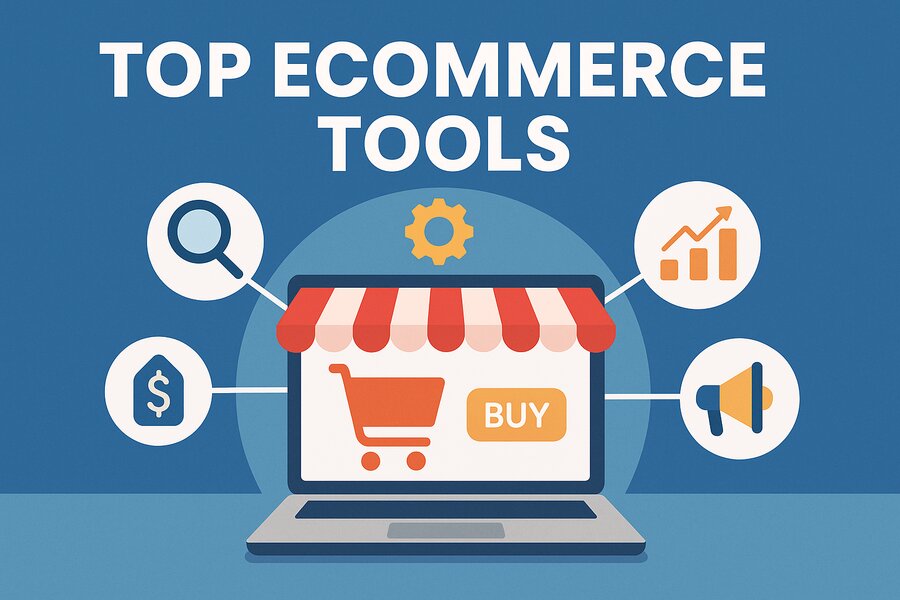Running an online store means juggling tasks at once. A customer asks about shipping while you’re updating inventory, emails need scheduling during order fulfillment, and that wholesale inquiry gets buried in your inbox.
Ecommerce tools turn chaos into systems. They’re not just software — they’re the difference between drowning in tasks and growing your business. Automation handles repetitive work.
Integrations mean your inventory talks to your email platform, which talks to your shipping provider. Everything connects.
Here’s what changes: You stop being a task-switcher and start being a business owner. Join us below to discover the best tools for ecommerce in 2025.
Why ecommerce tools matter
Every minute you spend on repetitive tasks, a competitor spends on growth. They’re not working harder — their systems handle the repetitive parts automatically.
Example: You check inventory levels twice daily. Your competitor’s system updates in real-time and triggers reorder alerts. You lose sales to stockouts that they never experience.
The compound effect matters. Email flows nurture customers while you sleep. Analytics spot trends you’d miss in spreadsheets. Support systems mean issues get solved once, not bounced between channels. These efficiencies multiply into advantages.
Building your tech stack isn’t about tool collecting. Businesses need five platforms that talk to each other, not twenty that create more work. Pick tools that solve your time drains first.
Best WordPress ecommerce tools
Check out these tools to try in 2025:
- Omnisend — Multichannel Marketing Automation

Email drives revenue, but managing campaigns across email, SMS, and push means juggling platforms. Omnisend puts everything in one workflow — your abandoned cart email triggers, then SMS follows up, then push notification closes the deal.
Connect your WordPress and WooCommerce store and watch automations handle the heavy lifting. New customers get welcome sequences. Cart abandoners see their exact items with time-sensitive offers.
Post-purchase flows collect reviews while suggesting complementary products. Browse abandonment catches window shoppers. VIP customers get the treatment they deserve without you lifting a finger.
The visual builder shows exactly how customers move through your sequences. See where they convert, where they drop off, and which messages drive revenue. No guessing about what works — the attribution data proves it.
In addition to ecommerce stores, Omnisend also works for subscription businesses, loyalty schemes, affiliates, and startups.
Key features
- 30+ workflow templates ready to customize
- Visual builder maps customer journeys
- SMS and push in the same automation flows
- Revenue attribution per campaign
- Dynamic content personalization
- Minimal impact on site performance and Core Web Vitals
Pricing
- Free: Up to 250 contacts
- Standard: From $16/month
- Pro: From $59/month
G2 rating: 4.6/5 stars. Users highlight its intuitiveness and customer support quality.
- Tidio — AI-Powered Customer Support
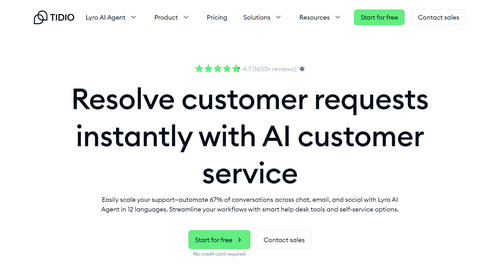
Customers expect instant answers at 2 AM on Sunday. Tidio’s AI chatbot Lyro handles the midnight “where’s my order” questions while you sleep. It learns from your knowledge base, answering routine queries and knowing when to escalate to humans.
Everything lands in one inbox — live chat, AI conversations, emails, Facebook messages. Your team sees what pages visitors browsed and their purchase history before typing a response.
Pre-chat surveys grab order numbers and issue types upfront, saving back-and-forth. The AI gets smarter daily, handling more conversations without intervention.
Mobile apps mean your team responds from anywhere. Set office hours so customers know when humans are available versus AI. Route VIP customers straight to senior agents. Small touches that make support feel personal at scale.
Key features
- Lyro AI chatbot with learning capabilities
- Omnichannel inbox consolidation
- Visitor tracking and context
- Pre-built response templates
- iOS and Android mobile apps
Pricing
- Free: Up to 50 conversations
- Starter: $29/month
- Growth: From $59/month
G2 rating: 4.7/5 stars for implementation speed and AI accuracy.
- ShipStation — Shipping and Fulfillment Automation
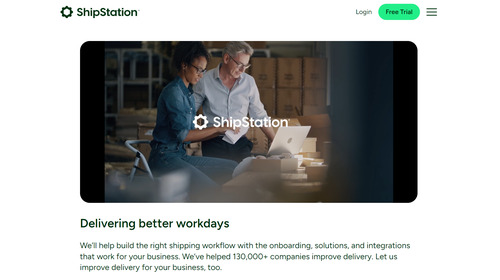
ShipStation pulls orders from every sales channel and applies your rules automatically — it adds insurance to orders over $100, routes West Coast packages to FedEx, and sends lightweight items via USPS.
Batch processing transforms your workflow. You print 500 labels in minutes, compare carrier rates with one click, and send tracking emails that match your brand. Hours of manual work compress into minutes.
It generates customs forms, calculates duties and taxes upfront, and validates addresses before you ship, helping you avoid costly returns and delivery failures.
Key features
- Multichannel order import
- Carrier rate comparison
- Bulk label generation
- Automation rule engine
- Custom tracking pages
Pricing
- Starter: $9.99/month (50 shipments)
- Bronze: $29.99/month (500 shipments)
- Silver: $59.99/month (1,500 shipments)
G2 rating: 4.3/5 stars for time savings and reliability.
- Gorgias — Ecommerce Help Desk
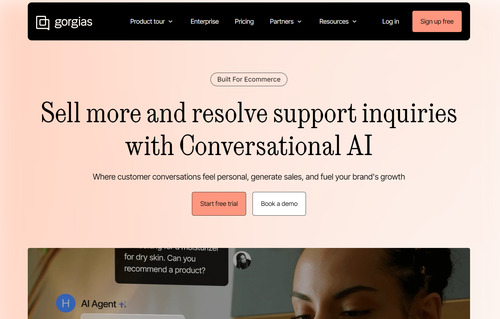
Support tickets scatter everywhere — email, Instagram DMs, chat, SMS. Gorgias pulls them into one screen built for ecommerce. Agents modify orders, process refunds, and check inventory without leaving the conversation.
Macros transform support speed. Type shortcuts that expand into complete responses with customer data auto-filled. “Order status” becomes a personalized update with tracking info.
Revenue tracking shows which agents and responses actually keep customers happy. Route angry customers to your best de-escalators automatically.
The Shopify integration runs deep. See lifetime value while answering tickets. Apply discounts. Extend return windows. Cancel subscriptions. Everything that requires platform switching typically happens in one place.
Key features
- Unified multichannel inbox
- Native ecommerce integrations
- Macro automation system
- Revenue impact tracking
- Skills-based routing
Pricing
- Basic: $10/month (50 tickets)
- Pro: $60/month (300 tickets)
- Advanced: $360/month (2,000 tickets)
G2 rating: 4.6/5 stars for ecommerce functionality.
- Klaviyo — Email and B2C CRM
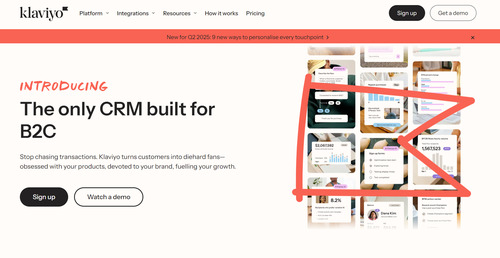
Forget basic email blasts. Klaviyo uses machine learning to predict which customers will buy again, who’s about to churn, and when each person actually opens emails. Your campaigns adjust automatically based on these predictions.
Benchmarking shows where you stand. Your 23% cart recovery rate? Klaviyo shows that similar stores hit 31% and suggests specific improvements.
Product recommendations analyze purchase patterns and browsing history. That customer who bought running shoes sees socks and water bottles, not random products.
Segments update themselves. Big spenders automatically get VIP treatment. Window shoppers see different messaging than loyal customers. The platform handles the complexity while you focus on strategy.
Key features
- Predictive CLV modeling
- Churn risk scoring
- Individual send time optimization
- Industry benchmarking data
- AI-powered product recommendations
Pricing
- Free: Up to 250 contacts
- Email: From $20/month
- Email & SMS: From $35/month
G2 rating: 4.6/5 stars for advanced segmentation.
- Hotjar — Customer Behavior Analytics
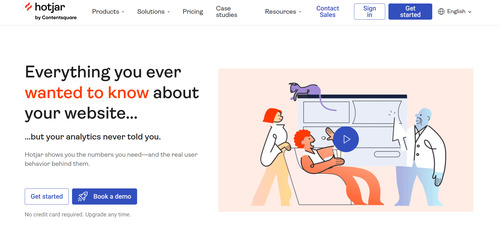
Numbers tell what happened. Hotjar shows why. Watch real people navigate your store through session recordings. Session recordings expose the truth about your user experience, helping you optimize conversion rates.
Watch customers struggle with checkout flows you thought were simple. See them hover over prices, hesitate at shipping options, then close the tab. Real behavior beats every assumption you’ve made about your site.
Heatmaps turn thousands of visits into visual data. The hot spots show where people click, often nowhere near your “buy now” buttons.
Scroll maps reveal that most visitors never see your best content because it’s too deep. Armed with this data, you redesign based on evidence.
Feedback tools capture frustration while it’s fresh. A simple widget lets customers report issues instantly. Survey responses explain why that perfect product page converts poorly. The qualitative data fills gaps that analytics can’t touch.
Key features
- Click and scroll heatmaps
- Session recording playback
- On-page feedback collection
- Funnel visualization
- Survey deployment tools
Pricing
- Basic: Free (35 daily sessions)
- Plus: $39/month
- Business: $99/month
G2 rating: 4.3/5 stars for insight depth.
Final thoughts
Your most significant operational pain point should guide your first tool choice. Maybe customers wait days for responses while orders pile up, or shipping errors cost you hundreds in replacements monthly. Start there.
Success depends on tools talking to each other. An email platform that requires CSV uploads from your store creates more work, not less. During trials, send test orders through the entire flow. Watch data move between systems. Any manual steps will haunt you at scale.
Most businesses fail by buying complexity they don’t need. That enterprise platform with 500 features sounds impressive until you realize your team only uses 10.
Better to master simple tools that match your workflow than wrestle with systems built for companies 10x your size.

